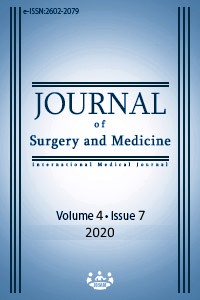Pregnancy outcomes in patients with MTHFR gene polymorphism: A case series
Keywords:
MTHFR C677T, MTHFR A1298C, Treatment, In-vitro fertilization, Abortion, ComplicationAbstract
Aim: Based on the literature, MTHFR polymorphism is common among the general population and is controversial in terms of treatment, as it is poorly associated with pregnancy complications. In this study, we aimed to investigate the relationship between treatment and pregnancy outcomes in patients with MTHFR polymorphism.
Methods: The data of 48 patients who were diagnosed with MTHFR C677T and A1298C polymorphism between June 2012 and April 2020 and followed up during their pregnancy were reviewed retrospectively. Demographic and clinical features of patients, pregnancy history, diagnosis, and perinatal complications were examined. Pre- and post-treatment clinical features of the patients were compared.
Results: Comparison of pre- and post-treatment pregnancy data of the patients revealed that live birth rates were significantly higher (pre-treatment: 9.4% post-treatment: 68.7%, P=0.001) and abortion rates were significantly lower after treatment (pre-treatment: 81.2%, post-treatment: 32.1%, P=0.001). Pregnancy complications were observed in 9 (18.3%) patients. It was observed that among patients with MTHFR gene mutation, live birth rates increased by 24.12-fold and by 3.76-fold for each year of decrease in the age of conception following treatment.
Conclusion: In pregnant women with MTHFR polymorphism, methionine-poor diet and medical treatment had a positive effect on pregnancy outcomes. It was also observed that among those with MTHFR gene polymorphism, young patients with MTHFR A1298C heterozygotes had the best treatment results.
Downloads
References
Ueland PM, Hustad S, Schneede J, Refsum H, Vollset SE. Biological and clinical implications of the MTHFR C677T polymorphism. Trends in Pharmacological Sciences. 2001;22(4):195-201. doi: 10.1016/s0165-6147(00)01675-8.
Weisberg I, Tran P, Christensen B, Sibani S, Rozen R. A second genetic polymorphism in methylenetetrahydrofolate reductase (MTHFR) associated with decreased enzyme activity. Molecular genetics and metabolism. 1998;64(3):169-72.
Rozen R. Genetic predisposition to hyperhomocysteinemia: deficiency of methylenetetrahydrofolate reductase (MTHFR). Thrombosis and haemostasis. 1997;78(01):523-6.
Klerk M, Verhoef P, Clarke R, Blom HJ, Kok FJ, Schouten EG. MTHFR 677C→ T polymorphism and risk of coronary heart disease: a meta-analysis. JAMA. 2002;288(16):2023-31. doi: 10.1001/jama.288.16.2023.
Grandone E, Margaglione M, Colaizzo D, Cappucci G, Paladini D, Martinelli P, et al. Factor V Leiden, C> T MTHFR polymorphism and genetic susceptibility to preeclampsia. Thrombosis and Haemostasis. 1997;77(06):1052-4.
Blount BC, Mack MM, Wehr CM, MacGregor JT, Hiatt RA, Wang G, et al. Folate deficiency causes uracil misincorporation into human DNA and chromosome breakage: implications for cancer and neuronal damage. Proceedings of the National Academy of Sciences. 1997;94(7):3290-5.
Amin S, Issa H, Ramzy A. Prevalence/Incidence of Hereditary and Acquired Thrombophilia Markers among Egyptian Females with Recurrent Pregnancy Loss or IVF Failure. J Blood Disord Transfus. 2018;10(412):2.
Zappacosta B, Mastroiacovo P, Persichilli S, Pounis G, Ruggeri S, Minucci A, et al. Homocysteine lowering by folate-rich diet or pharmacological supplementations in subjects with moderate hyperhomocysteinemia. Nutrients. 2013;5(5):1531-43. doi: 10.3390/nu5051531.
Servy EJ, Jacquesson-Fournols L, Cohen M, Menezo YJR. MTHFR isoform carriers. 5-MTHF (5-methyl tetrahydrofolate) vs folic acid: a key to pregnancy outcome: a case series. Journal of Assisted Reproduction and Genetics. 2018;35(8):1431-5. doi: 10.1007/s10815-018-1225-2.
Turgal M, Gumruk F, Karaagaoglu E, Beksac M. Methylenetetrahydrofolate Reductase Polymorphisms and Pregnancy Outcome. Geburtshilfe und Frauenheilkunde. 2018;78(09):871-8. doi: 10.1055/a-0664-8237.
Long S, Goldblatt J. MTHFR genetic testing: controversy and clinical implications. Australian family physician. 2016;45(4):237.
Wu X, Zhao L, Zhu H, He D, Tang W, Luo Y. Association Between the MTHFR C677T Polymorphism and Recurrent Pregnancy Loss: A Meta-Analysis. 2012;16(7):806-11. doi: 10.1089/gtmb.2011.0318.
Brenner B, Hoffman R, Blumenfeld Z, Weiner Z, Younis J. Gestational outcome in thrombophilic women with recurrent pregnancy loss treated by enoxaparin. Thrombosis and haemostasis. 2000;83(05):693-7.
Cetin O, Karaman E, Cim N, Dirik D, Sahin HG, Kara E, et al. The impact of low molecular weight heparin on obstetric outcomes among unexplained recurrent miscarriages complicated with methylenetetrahydrofolate reductase gene polymorphism. Ginekologia Polska. 2017;88(5):260-5. doi: 10.5603/GP.a2017.0049.
Martinelli I, Ruggenenti P, Cetin I, Pardi G, Perna A, Vergani P, et al. Heparin in pregnant women with previous placenta-mediated pregnancy complications: a prospective, randomized, multicenter, controlled clinical trial. Blood, The Journal of the American Society of Hematology. 2012;119(14):3269-75.
Cao Y, Xu J, Zhang Z, Huang X, Zhang A, Wang J, et al. Association study between methylenetetrahydrofolate reductase polymorphisms and unexplained recurrent pregnancy loss: a meta-analysis. Gene. 2013;514(2):105-11.
Lykke J, Bare L, Olsen J, Lagier R, Arellano A, Tong C, et al. Thrombophilias and adverse pregnancy outcomes: results from the Danish National Birth Cohort. Journal of Thrombosis and Haemostasis. 2012;10(7):1320-5. doi: 10.1111/j.1538-7836.2012.04773.x.
Laanpere M, Altmäe S, Kaart T, Stavreus-Evers A, Nilsson TK, Salumets A. Folate-metabolizing gene variants and pregnancy outcome of IVF. Reproductive biomedicine online. 2011;22(6):603-14. doi: 10.1016/j.rbmo.2011.03.002.
Ahangari N, Doosti M, Mousavifar N, Attaran M, Shahrokhzadeh S, Memarpour S, et al. Hereditary thrombophilia genetic variants in recurrent pregnancy loss. Archives of Gynecology and Obstetrics. 2019;300(3):777-82. doi: 10.1007/s00404-019-05224-7.
Nair RR, Khanna A, Singh K. MTHFR C677T polymorphism and recurrent early pregnancy loss risk in north Indian population. Reproductive Sciences. 2012;19(2):210-5. doi: 10.1177/1933719111417888.
Nelson SM, Lawlor DA. Predicting Live Birth, Preterm Delivery, and Low Birth Weight in Infants Born from In Vitro Fertilisation: A Prospective Study of 144,018 Treatment Cycles. PLoS Medicine. 2011;8(1):e1000386. doi: 10.1371/journal.pmed.1000386.
Chambers GM, Paul RC, Harris K, Fitzgerald O, Boothroyd CV, Rombauts L, et al. Assisted reproductive technology in Australia and New Zealand: cumulative live birth rates as measures of success. Medical Journal of Australia. 2017;207(3):114-8. doi: 10.5694/mja16.01435.
Downloads
- 3262 2329
Published
Issue
Section
How to Cite
License
Copyright (c) 2020 Alparslan Deniz
This work is licensed under a Creative Commons Attribution-NonCommercial-NoDerivatives 4.0 International License.
















